The AMD 2nd Gen Ryzen Deep Dive: The 2700X, 2700, 2600X, and 2600 Tested
by Ian Cutress on April 19, 2018 9:00 AM ESTCPU Encoding Tests
One of the interesting elements on modern processors is encoding performance. This includes encryption/decryption, as well as video transcoding from one video format to another. In the encrypt/decrypt scenario, this remains pertinent to on-the-fly encryption of sensitive data - a process by which more modern devices are leaning to for software security. Video transcoding as a tool to adjust the quality, file size and resolution of a video file has boomed in recent years, such as providing the optimum video for devices before consumption, or for game streamers who are wanting to upload the output from their video camera in real-time. As we move into live 3D video, this task will only get more strenuous, and it turns out that the performance of certain algorithms is a function of the input/output of the content.
All of our benchmark results can also be found in our benchmark engine, Bench.
7-Zip 9.2: link
One of the freeware compression tools that offers good scaling performance between processors is 7-Zip. It runs under an open-source licence, is fast, and easy to use tool for power users. We run the benchmark mode via the command line for four loops and take the output score.
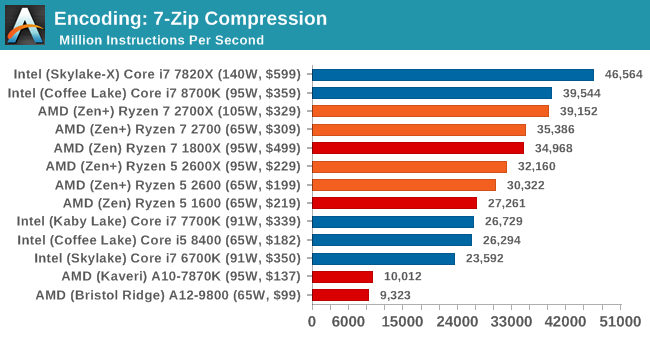
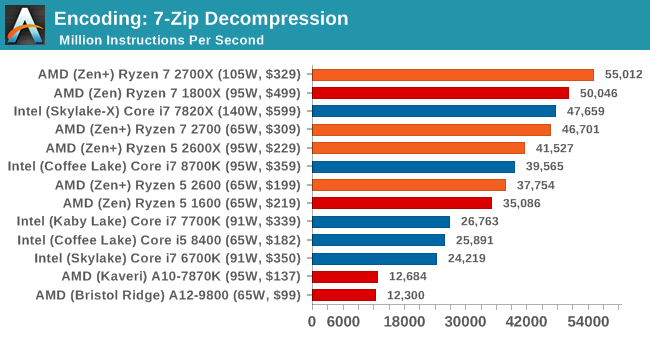
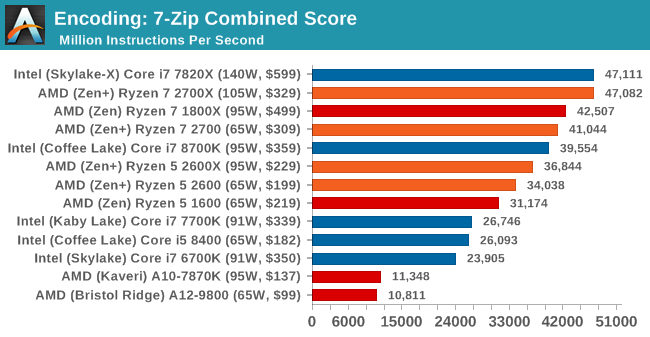
WinRAR 5.40: link
For the 2017 test suite, we move to the latest version of WinRAR in our compression test. WinRAR in some quarters is more user friendly that 7-Zip, hence its inclusion. Rather than use a benchmark mode as we did with 7-Zip, here we take a set of files representative of a generic stack (33 video files in 1.37 GB, 2834 smaller website files in 370 folders in 150 MB) of compressible and incompressible formats. The results shown are the time taken to encode the file. Due to DRAM caching, we run the test 10 times and take the average of the last five runs when the benchmark is in a steady state.
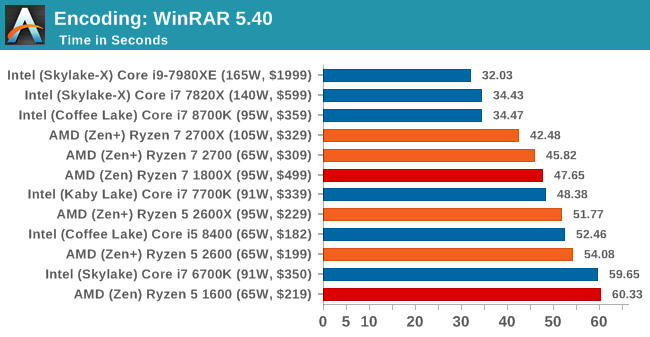
WinRAR requires a good memory base, so we see the quad-channel processors heading up the pack. The high IPC of the Core i7-8700K also does well.
AES Encoding
Algorithms using AES coding have spread far and wide as a ubiquitous tool for encryption. Again, this is another CPU limited test, and modern CPUs have special AES pathways to accelerate their performance. We often see scaling in both frequency and cores with this benchmark. We use the latest version of TrueCrypt and run its benchmark mode over 1GB of in-DRAM data. Results shown are the GB/s average of encryption and decryption.
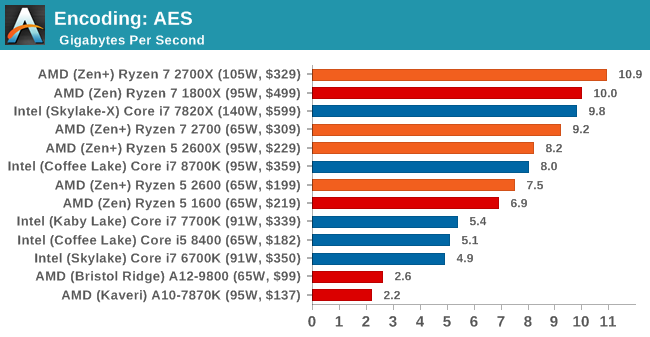
HandBrake v1.0.2 H264 and HEVC: link
As mentioned above, video transcoding (both encode and decode) is a hot topic in performance metrics as more and more content is being created. First consideration is the standard in which the video is encoded, which can be lossless or lossy, trade performance for file-size, trade quality for file-size, or all of the above can increase encoding rates to help accelerate decoding rates. Alongside Google's favorite codec, VP9, there are two others that are taking hold: H264, the older codec, is practically everywhere and is designed to be optimized for 1080p video, and HEVC (or H265) that is aimed to provide the same quality as H264 but at a lower file-size (or better quality for the same size). HEVC is important as 4K is streamed over the air, meaning less bits need to be transferred for the same quality content.
Handbrake is a favored tool for transcoding, and so our test regime takes care of three areas.
Low Quality/Resolution H264: Here we transcode a 640x266 H264 rip of a 2 hour film, and change the encoding from Main profile to High profile, using the very-fast preset.
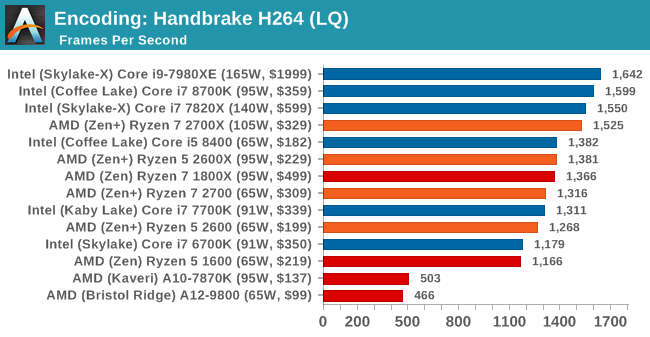
High Quality/Resolution H264: A similar test, but this time we take a ten-minute double 4K (3840x4320) file running at 60 Hz and transcode from Main to High, using the very-fast preset.
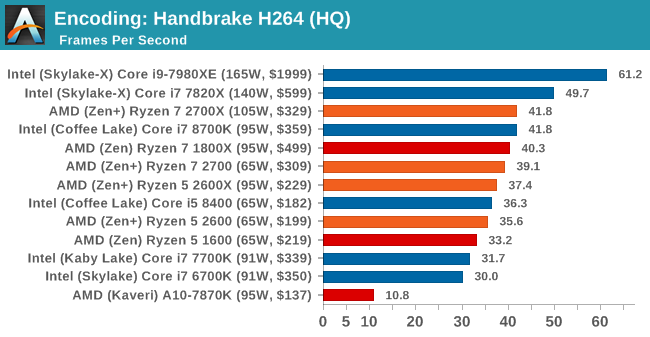
HEVC Test: Using the same video in HQ, we change the resolution and codec of the original video from 4K60 in H264 into 4K60 HEVC.
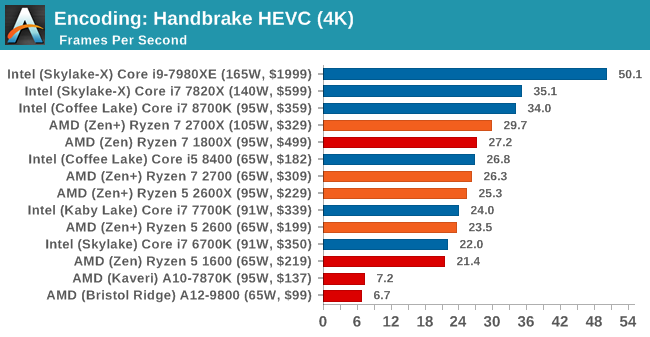
For HandBrake video encoding of large frames, there is a bump with the new Ryzen-2000 series processors over the previous generation, however there is still a gap up to the Core i7-8700K. The Core i5-8400 puts in a good showing here, above all but the best Ryzen parts.










545 Comments
View All Comments
RafaelHerschel - Thursday, April 19, 2018 - link
Hardware unboxed certainly did. It's a bit odd that you automatically assume that only Anandtech knows how to test.aliquis - Thursday, April 19, 2018 - link
If they don't rerun the tests with up to date software then they are useless.What I assume has happened here is some software, driver or firmware being "off" in the Anandtech review somehow.
RafaelHerschel - Thursday, April 19, 2018 - link
@Ryan Smith That is an excellent response.krumme - Thursday, April 19, 2018 - link
AT run bm at Jdec specs. 2666 for 8700k 2933 for 2700x. That and the security patches.Hifihedgehog - Thursday, April 19, 2018 - link
I was also totally misled. I came here first, only to find out after having misleading people online that this site’s results are completely off. I am a big AMD fan but these results need to be audited and corrected.Ryan Smith - Thursday, April 19, 2018 - link
"these results need to be audited and corrected."Validating right now.=)
stefanve - Thursday, April 19, 2018 - link
Clearly someone didn't apply his meltdown patch ....casperes1996 - Thursday, April 19, 2018 - link
Advice for the future:Don't be a prick.
Ian isn't lying to you. He's sharing the data his benchmarking showed. It being different to other reviewers is something he'll gladly look into, and is in fact looking into, but you ought to show yourself as a respectful individual when you point it out, otherwise you won't be listened to.
MadManMark - Thursday, April 19, 2018 - link
Hear, hear!bfoster68 - Thursday, April 19, 2018 - link
Chris113q,I did one for you since you seemed to be having issues.
If you read below they use a different methodology for estimating fps vs what AnandTech did in their review. the result is nearly the same. solid gains for AMD on a incremental upgrade. Was that so hard?
https://www.tomshardware.com/reviews/amd-ryzen-7-2...